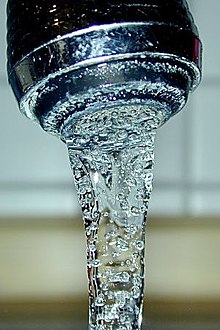Water
- For water in its solid state see Ice
Water is the most common liquid on earth. It has no smell, taste, or noticeable colour. Lakes, oceans, and rivers are made of water. Rain is water that falls from clouds in the sky. If water gets very cold, it freezes and becomes ice. Frozen rain can be ice or snow. If water gets very hot, it boils and becomes steam.

Plants and animals (including people) must drink water to live. Water is important to living cells because it can dissolve many things. It gives the medium for chemical reactions to take place, and carries things around the body in blood. It helps to keep the body temperature unchanging by sweating from the skin. Water helps blood carry nutrients from the stomach to all parts of the body to keep the body alive. Saliva helps animals and people digest food. Water also dilutes bad things in the body. Water helps make urine. Urine helps remove bad chemicals from the body. The human body is 50%-65% water.
Water is the main component of drinks like milk, juice, and wine. Each type of drink also has other things that add flavor or nutrients, things like sugar, fruit, and sometimes alcohol. Water that the person can drink is called "potable" (or "drinking") water. The water in oceans is salt water, but lakes and rivers usually have fresh water.
Water is the molecule made of 2 hydrogen atoms and 1 oxygen atom. Its formula is H2O.
Water has the surface tension. Thus the little water forms drops on the surface, rather than spreading out to wet the surface.
There are many things with "water" in air names. Here are some examples:
See also
editOther websites
edit| Find more about water at Wikipedia's sister projects | |
| Definitions and translations from Wiktionary | |
| Media from Commons | |
| Learning resources from Wikiversity | |
| Quotations from Wikiquote | |
| Source texts from Wikisource | |
| Textbooks from Wikibooks | |